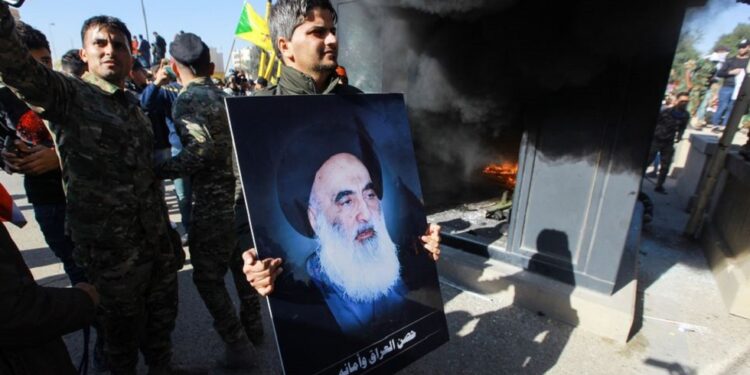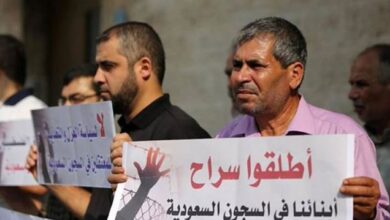Iraq: Wide-scale popular anger over Saudi journalist’s assault on Ali al-Sistani

Hundreds of Iraqis demonstrated near one of the Green Zone gates, which includes the Saudi embassy in the center of the capital, Baghdad, in protest against a satirical drawing that they considered as an offensive to the Shiite Ali al-Sistani, published by the Saudi newspaper Asharq Al-Awsat.
The demonstrators tried to approach one of the gates of the Green Zone, where the security forces confronted them, using tear gas.
Amjad al-Husseini, one of the organizers of the demonstration, said that seven protesters were slightly injured, as he stressed that Sistani is a red line for the Iraqis.
Videos showed slogans in support of Sistani, in front of the Saudi embassy in the capital, Baghdad.
Yesterday, the Saudi newspaper issued a statement denying any abuse to al-Sistani, saying that it abides by the professional rules in its dealings with countries, people, and references, and confirms that the drawing was not intended at all to refer to his person.
The newspaper added that the caricature was intended to refer to the Iranian interference in the Iraqi affairs.
Iraqi political parties condemned the drawing, calling on the government to take firm measures to stop what it considered to be violations of religious symbols in the country.
Sistani is widely respected in Iraq, especially among Iraqis in the center and south of the country.
Over the past years, his views have had impacts on the political and social life.
A former American magazine revealed a chaotic role of the Saud regime in the popular protests that took place in Iraq in October 2019.
Foreign Policy magazine discussed the ongoing protests in Iraq, demonstrating the demonstrators’ anger at corruption and foreign influence.
The magazine talked about Saudi’s attempt to benefit from it through the use of social media, and considered that the dismissal of a popular military commander from his position was one of the factors that led to popular protests outbreak.
Ahmed Tuwaij, says in his article in this American magazine that the Saudi regime seeks to feed these tensions, which sees it as an opportunity to drop what it considers an Iraqi government loyal to Iran.
He adds that Riyadh has started to use social media platforms to perpetuate violent protests in Iraq, robots, or automated software have been created to target Western media, and tweets have been posted by users loyal to Saudi Arabia to promote the slogans “Save the people of Iraq, drive out Iran” despite blocking the Internet in Iraq.
The Kingdom – which has used communication platforms to pursue its opponents and dissident activists – is trying to spread and promote anti-Iran sentiments in Iraq.
The protests also witnessed a noticeably strong Shiite presence, punctuated by some slogans expressing strong dissatisfaction with Iranian interference in Iraq, similar to the sentiments expressed by the protesters who attacked the Iranian consulate in Basra in 2018.





